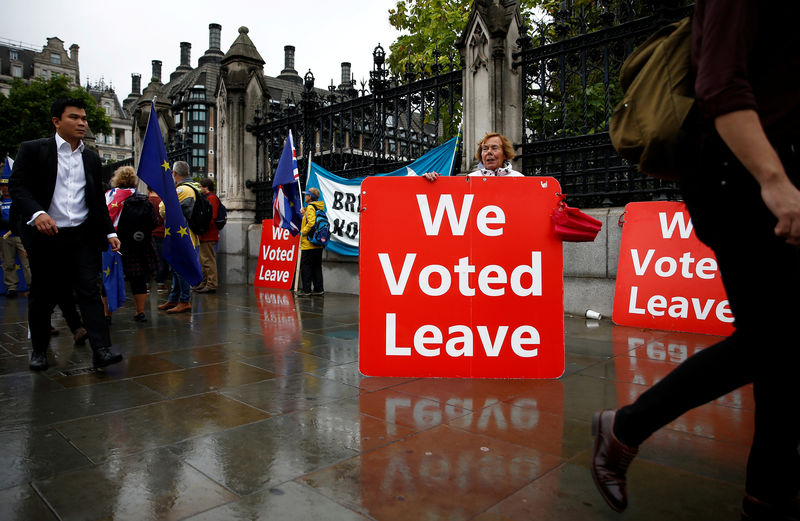By Saikat Chatterjee and Richard Pace
LONDON (Reuters) - Fading hopes that Tuesday's UK Supreme Court verdict quashing Prime Minister Boris Johnson's suspension of parliament marked a big step back from a no-deal Brexit have seen the pound's gains dissolve as investors prepare for yet more uncertainty.
For the first 24 hours after the court ruled Johnson had acted unlawfully in proroguing parliament, sterling rallied. But a vitriolic parliamentary session on Wednesday made clear that the political deadlock over Brexit is far from broken, heralding a difficult few months for the pound and other British assets.
For some money managers, such as Kaspar Hense, a portfolio manager at Bluebay Asset Management, the court verdict is nevertheless a reason to stick with a bullish pound conviction. He ditched his long-held bearish stance on the British currency at the end of August.
Hense, whose team manages $60 billion (49 billion pounds), says markets are overpricing the risk of the United Kingdom leaving the European Union without an exit deal to minimise economic disruption.
"We think the probability of no-deal has fallen even further," Hense said, predicting the pound would strengthen to 85 pence against the euro before there is a general election. It was trading at 88.8 pence on Friday.
Betting markets support Hense's view and increasingly doubt Brexit will happen at all next month. Odds on Johnson managing to strike a deal with Brussels are now at 5/1 compared with 7/2 last week, according to Betfair Exchange.
And odds on Johnson leaving Downing Street in 2019 have narrowed to 2/1 from 11/4 last week. Currency traders might see that as positive given his willingness to embrace an abrupt exit if a deal cannot be secured.
On the other hand, action in the pound, buffeted for three years by Brexit news, implies that even if a no-deal scenario is averted, the path towards that outcome will be rocky.
Having risen more than 5% from a three-year low of below $1.20 on Sept. 3 to $1.2582 last week, and popping up half a cent on the Supreme Court ruling, the pound slipped back towards $1.23 on Thursday.
The ruling increased confidence in UK assets, "but the prospect of a general election and potential Corbyn government would unsettle things anew" said Rory McPherson, head of investment strategy at Psigma Investment Management. Opposition leader Jeremy Corbyn's Labour Party has promised nationalisation, higher taxation and tighter regulation.
The main risk seen by markets is that Johnson circumvents parliament's wishes and manages to take the UK out of the EU by Oct. 31 without a deal.
Second is a general election by year-end. Opinion polls put Johnson' Conservatives in the lead, with all that means for a Brexit crash, but markets are also wary of a Labour victory.
No overall majority would leave parliament stuck where it is now on Brexit -- split down the middle.
The possibility of a Brexit extension to Jan. 31 is hardly a balm for long-term investors either.
"To believe a no-deal Brexit will be successfully avoided, the anti-Brexit parties have to win the general election when it happens and there is simply no way of knowing that," said Kamal Sharma, head of G10 FX strategy at Bank of America (NYSE:BAC) Merrill Lynch.
Sharma is avoiding directional bets on the pound and instead recommends buying implied volatility options for sterling -- a gauge of expected price swings in an asset.
Investors tend to buy these options as protection against volatility around key dates and their high price -- implied volatility gauges for the pound are currently double those on the yen and euro -- essentially reflects purchasers' unease.
https://fingfx.thomsonreuters.com/gfx/mkt/12/6588/6519/G7%20vs%20GBP%20vol.png
Three-month options encompassing the Oct. 31 Brexit date and possibly a late October or early November election are meanwhile trading much higher than any other maturity along the one-month to one-year curve.
Two-month implied volatility has also risen, given its expiry date could also capture an election.
One-month expiry options, encompassing the Oct. 19 deadline set by parliament for Johnson to seek a Brexit extension, have receded slightly since the ruling but remain elevated.
Six-month implied vol -- capturing the next potential Brexit date of Jan. 31 if an extension is agreed -- remains subdued but could be the next contract to watch.
Adam Cole, chief strategist at RBC Capital Markets says that while his proprietary gauge shows the likelihood of an Oct. 31 no-deal Brexit has ebbed, it could rise again.
"A delay now looks inevitable ... there is no (option) price for 2020 yet, but markets are no doubt rolling some risk into 2020," he added.
https://fingfx.thomsonreuters.com/gfx/mkt/12/6598/6529/GBP%20Positions.png
Bearish pound positions in futures markets have neared historical extremes in the last week, with hedge funds raising their net positions against the pound to $6.7 billion, just off 2-1/2 year peaks of $7.8 billion touched in early September.
Another barometer of appetite for the currency is risk reversals -- contracts using calls or puts to hedge a position, essentially options that confer the right to buy or sell at a pre-set price.
Three-month risk reversals show a significant negative view on the pound -- meaning the premium for puts is far greater around the election timeframe
There is a bright spot -- pound weakness has encouraged overseas buyers to snap up British assets, from pubs to theme parks in a flurry of dealmaking that brings investment into a country dogged by persistent current account deficits.
"You have started to get UK assets picked off -- Greene King (LON:GNK), Cobham (LON:COB) -- and that seems to be getting some traction," said McPherson, though he added that portfolio managers were still wary.
"A bit of that is Brexit," he said.

https://fingfx.thomsonreuters.com/gfx/mkt/12/6589/6520/pound%20risk%20reversals.png